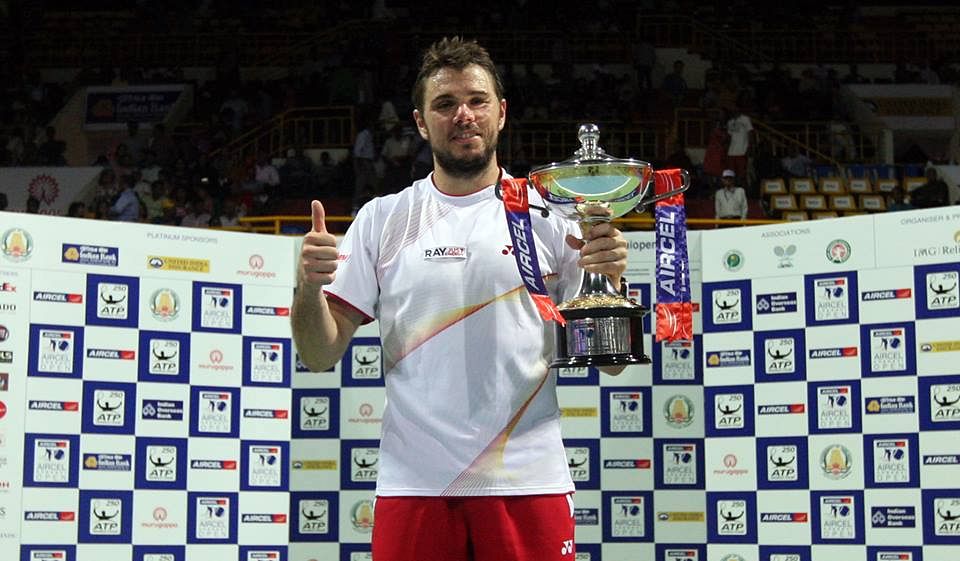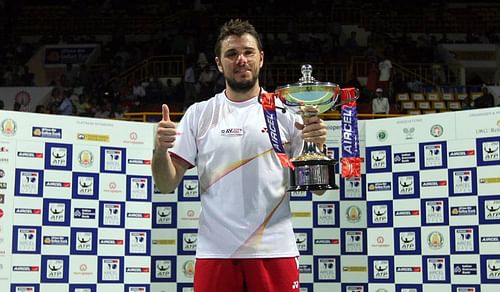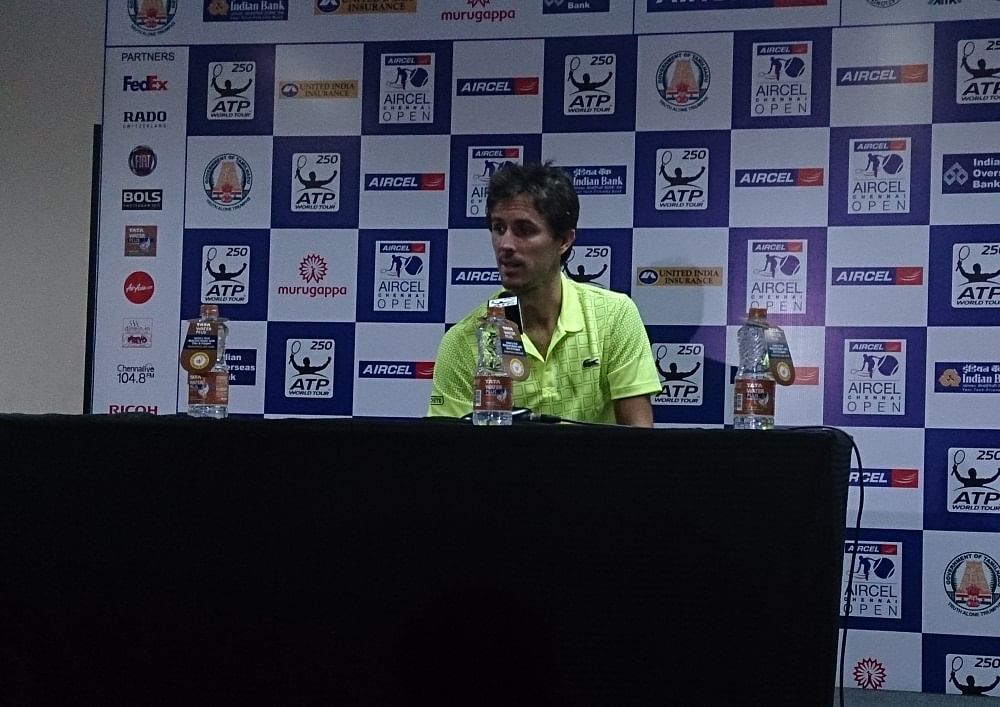
Aircel Chennai Open 2014: Stanislas Wawrinka and the changing times

Stanislas Wawrinka with the 2014 Chennai Open trophy
It’s always been considered fashionable to say, preferably with a sigh of thinly veiled disapproval, that ‘the times have changed’. These four simple words immediately make the speaker sound experienced, perceptive and wise, all at the same time, so it’s not hard to see why no one ever misses the chance to utter them. Today, as one Swiss player fell to an old punching bag and another cemented his place in the shining spotlight, those four words were on the minds of everyone who watched the two matches separated by thousands of miles. Only, this time no one found the need to actually say them out loud because – there’s no better way to put this – it would have been too mainstream to do so.
Hours after Roger Federer stuttered in the Brisbane final to a three-set defeat against Lleyton Hewitt – the man he once regularly beat like a drum – Stanislas Wawrinka put the finishing touches on his indomitable Chennai campaign, establishing some measure of distance between him and the rest of the (non-top 10) field. Coming on the back of some tectonic changes in the fortunes of the two compatriots, these two results may well signify a reversal of the pecking order in Switzerland – something that was unimaginable less than a year ago.
Why does this tournament represent such a sea change for Wawrinka? He has won titles in the past, after all – four of them, in fact. The difference, of course, lies in the expectations that were heaped upon him at this tournament, and the unique pressures that such expectations bring. Never before had Wawrinka been such an enormous title favourite; the moment Mikhail Youzhny pulled out of the tournament, the Swiss had been anointed as the champion by most of the people attending the stadium over the course of the seven days. The difficulty of dealing with a whole new set of pressure points is something that can never be understated. Fortunately for Wawrinka, ‘understated’ is the last thing that anyone will ever associate with his game.
Edouard Roger-Vasselin, the man who Wawrinka beat today in the Aircel Chennai Open final, seemed to have recognized very early the perils of letting Wawrinka’s game gather too much steam. He came forward on the very first point of the match, and tucked the volley away neatly. That seemed to indicate to everyone in the arena, including Roger-Vasselin himself, what his best strategy for victory should be: attack the net to take time away from Wawrinka and prevent him from getting into a groove on the baseline.
The very next point Roger-Vasselin did exactly that, but in his eagerness to put the point to bed he netted a routine overhead. The pattern had been established, and it would last till the end of the match – Roger-Vasselin would pocket many a point by coming to the net, but he would alternate those winning moments with points given up through a combination of his own tentativeness and the quality of Wawrinka’s passing shots. Attacking the net turned out to be a 50-50 proposition for Roger-Vasselin, and that is not nearly good enough to win you an ATP 250 title.
Still, the match remained fairly competitive till the business end of the first set, mostly on the strength of Roger-Vasselin’s good serving; he saved a bunch of break points at 1-1 by handcuffing Wawrinka with his serve, and maintained a high first-serve percentage all through the match. At 5-5, however, the unfavourable odds of Roger-Vasselin’s net play came into painful focus. He hit a mediocre crosscourt backhand approach that Wawrinka had no trouble putting away for a passing shot winner, and followed that with a botched backhand down the line approach that sailed wide. In a game of such fine margins as tennis, that was all the invitation that Wawrinka needed to get the first set in his bag.
The crowd, which had been firmly in Wawrinka’s corner right from the start of the tournament, now started to show some love for the underdog. Or maybe it was the ‘namaste’ gesture that Roger-Vasselin showcased after his semifinal win that won a few of them over? No matter what the reason, cries of ‘Come on Roger!’ started picking up in different corners of the stadium, pushing the decidedly more convoluted ‘Come on Wawrinka’ shouts to the background. At one point there was even a long-winding ‘Let’s go Roger, let’s go! (followed by three claps) sequence that forced the umpire to ask for decorum to be maintained. There’s nothing like impending doom to stir up the emotions, is there?
Roger-Vasselin did everything in his power to hold off that doom. He continued putting a high percentage of first serves in play, tried to mix up the direction of his shots, and attacked the net, as he was wont to do, at every opportunity. But with Wawrinka’s game slowly rounding into form, none of that worked. There’s only so much you can do when confronted with Wawrinnka’s smooth power off both wings, and for every delicate drop volley that Roger-Vasselin pulled off, Wawrinka responded with a couple of laser groundstroke winners.

Edouard Roger-Vasselin at his press conference
In his post-match press conference, Roger-Vasselin asserted what most people watching already suspected. “I think it (approaching the net) was the best way for me to win. I tried that in Basel and it worked well. But today he was returning much better, passing much better…he had an answer to everything I tried. Too good.”
Too good – that’s what Wawrinka was for Roger-Vasselin today, and that’s what made the final result a bit of a foregone conclusion. But there was a moment of drama before we got there.
At 1-3, break point down, Roger-Vasselin forayed to the net yet again, but as he lunged forward he lost his balance and tumbled downward. Wawrinka put away the easy backhand passing shot, and Roger-Vasselin lay on the court for a few seconds, prompting fears of yet another withdrawal. But then he got up and headed for his chair without any visible discomfort, and everyone realized that his motionlessness had more to do with disappointment than injury. Having gone down by two breaks, there seemed very little light at the end of the tunnel for him, and through the rest of the match both the players seemed to be going through the motions, waiting for the inevitable moment of Wawrinka’s victory.
That moment duly arrived three games later, as Wawrinka put in an emphatic hold to clinch the set 6-2, and with it his second Chennai title. The celebrations and commemorations continued long into the evening, with the crowd (who were back to their throaty appreciation for Wawrinka) letting out almighty roars every time his name came up in the presentation ceremony. Wawrinka’s gracious speech helped, of course: he said all the right things, praising the organizers, the crowd and his coach, and maintaining his deferential respect for the Federers, Nadals and Djokovics when asked by Charu Sharma whether there was any difference between him and the ‘Big 4’ of men’s tennis.
Is it time for Wawrinka to let go of that respect, though? No one can question that his game is now good enough to not just challenge the field, but to dominate it too. This was an imperious run from him; at no stage in the tournament did he ever look in danger of going home without the trophy, and when the time came for him to put the final stamp of authority on the event, he grabbed the opportunity with unprecedented urgency.
At the post-match conference, Wawrinka continued in the same slightly self-deprecating vein that he displayed at the presentation ceremony. When asked which of his two Chennai Open victories was more special to him, Wawrinka responded with a smile, “You know, I haven’t had so many victories on the tour, so they are all special”. When asked which he would opt for if had to choose between a Grand Slam title and the World No. 1 ranking, he looked genuinely incredulous and said, “Win a Grand Slam or be World No. 1? I can’t choose either of those options – they’re both too far for me. It’s not a question that I would ask myself.”
But maybe you should start asking yourself that question, Stan. Haven’t you heard? The times, they are a-changing.